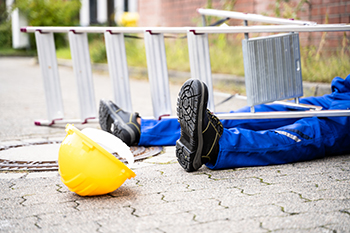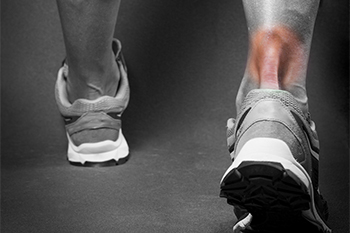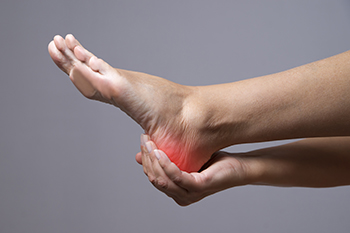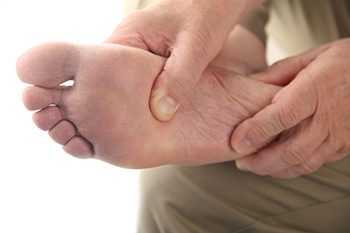Items filtered by date: July 2023
Fall Prevention in the Home and Workplace

Falling is dangerous in many ways. It can invoke a fear of falling, causing the inability to complete daily activities. Additionally, many foot injuries can happen as a result of falling, and this can happen in the home or workplace. The majority of falls can be prevented by implementing simple methods that can make the home and working environment safer. Many people at work have to use ladders for various reasons, and it is important the ladder is on stable ground. Additionally, a locking device can secure the ladder, and wearing slip-resistant shoes while climbing the ladder may help to prevent falling. Removing worn rugs from the living environment and clearing clutter from walkways can help to keep the home safe from falling. Many people install grab bars in the shower and toilet area, which can provide security while in these rooms. If you would like information about how falling can affect the feet, it is suggested that you speak with a podiatrist who can provide you with prevention techniques.
Preventing falls among the elderly is very important. If you are older and have fallen or fear that you are prone to falling, consult with Dr. Michael A. Wood from Foot Health Institute. Our doctor will assess your condition and provide you with quality advice and care.
Every 11 seconds, an elderly American is being treated in an emergency room for a fall related injury. Falls are the leading cause of head and hip injuries for those 65 and older. Due to decreases in strength, balance, senses, and lack of awareness, elderly persons are very susceptible to falling. Thankfully, there are a number of things older persons can do to prevent falls.
How to Prevent Falls
Some effective methods that older persons can do to prevent falls include:
- Enrolling in strength and balance exercise program to increase balance and strength
- Periodically having your sight and hearing checked
- Discuss any medications you have with a doctor to see if it increases the risk of falling
- Clearing the house of falling hazards and installing devices like grab bars and railings
- Utilizing a walker or cane
- Wearing shoes that provide good support and cushioning
- Talking to family members about falling and increasing awareness
Falling can be a traumatic and embarrassing experience for elderly persons; this can make them less willing to leave the house, and less willing to talk to someone about their fears of falling. Doing such things, however, will increase the likelihood of tripping or losing one’s balance. Knowing the causes of falling and how to prevent them is the best way to mitigate the risk of serious injury.
If you have any questions, please feel free to contact one of our offices located in Lansing, and Chicago, IL . We offer the newest diagnostic and treatment technologies for all your foot care needs.
Heel Pain and Achilles Tendon Injuries

The Achilles tendon connects the calf muscles to the heels, and despite it being strong, it is not especially flexible. This tendon has a small amount of room to move and an injury can cause it to stretch beyond its normal limits. The noticeable symptoms when the Achilles tendon stretches too far are inflammation, irritation, heel pain, and it is often difficult to walk. People who run and increase speed and distance too quickly may be prone to incurring an Achilles tendon injury, and it is beneficial to perform specific stretches to loosen up this tendon before starting a run. This type of injury may also happen from training in cold weather, having poor running form, or having flat feet. A patient may often seek advice from a podiatrist to find relief from the severe pain this type of injury can cause. An X-ray can be performed that can rule out a fractured bone. If you have heel pain, it is suggested that you visit a podiatrist who can successfully treat an Achilles tendon injury.
Achilles tendon injuries need immediate attention to avoid future complications. If you have any concerns, contact Dr. Michael A. Wood of Foot Health Institute. Our doctor can provide the care you need to keep you pain-free and on your feet.
What Is the Achilles Tendon?
The Achilles tendon is a tendon that connects the lower leg muscles and calf to the heel of the foot. It is the strongest tendon in the human body and is essential for making movement possible. Because this tendon is such an integral part of the body, any injuries to it can create immense difficulties and should immediately be presented to a doctor.
What Are the Symptoms of an Achilles Tendon Injury?
There are various types of injuries that can affect the Achilles tendon. The two most common injuries are Achilles tendinitis and ruptures of the tendon.
Achilles Tendinitis Symptoms
- Inflammation
- Dull to severe pain
- Increased blood flow to the tendon
- Thickening of the tendon
Rupture Symptoms
- Extreme pain and swelling in the foot
- Total immobility
Treatment and Prevention
Achilles tendon injuries are diagnosed by a thorough physical evaluation, which can include an MRI. Treatment involves rest, physical therapy, and in some cases, surgery. However, various preventative measures can be taken to avoid these injuries, such as:
- Thorough stretching of the tendon before and after exercise
- Strengthening exercises like calf raises, squats, leg curls, leg extensions, leg raises, lunges, and leg presses
If you have any questions please feel free to contact one of our offices located in Lansing, and Chicago, IL . We offer the newest diagnostic tools and technology to treat your foot and ankle needs.
Several Reasons Heel Pain Can Develop

The heel is an interesting part of the foot. It is a cushioned area that is formed with fatty tissue and is able to hold the weight of the body. Patients may experience heel pain for various reasons. These can include frequently standing or walking on hard surfaces, becoming obese, or if a foot injury has occurred. The condition that is known as plantar fasciitis affects the heel and can be painful. It can happen as a result of an irritated plantar fascia, which is the portion of tissue on the sole of the foot that connects the heel to the toes. This can become injured or torn, and medical attention is often sought for relief. Heel pain can also happen from wearing shoes that do not fit correctly, or if a heel spur has developed. If you have heel pain, it is strongly suggested that you consult a podiatrist who can correctly determine what the cause is, and offer effective treatment options.
Many people suffer from bouts of heel pain. For more information, contact Dr. Michael A. Wood of Foot Health Institute. Our doctor can provide the care you need to keep you pain-free and on your feet.
Causes of Heel Pain
Heel pain is often associated with plantar fasciitis. The plantar fascia is a band of tissues that extends along the bottom of the foot. A rip or tear in this ligament can cause inflammation of the tissue.
Achilles tendonitis is another cause of heel pain. Inflammation of the Achilles tendon will cause pain from fractures and muscle tearing. Lack of flexibility is also another symptom.
Heel spurs are another cause of pain. When the tissues of the plantar fascia undergo a great deal of stress, it can lead to ligament separation from the heel bone, causing heel spurs.
Why Might Heel Pain Occur?
- Wearing ill-fitting shoes
- Wearing non-supportive shoes
- Weight change
- Excessive running
Treatments
Heel pain should be treated as soon as possible for immediate results. Keeping your feet in a stress-free environment will help. If you suffer from Achilles tendonitis or plantar fasciitis, applying ice will reduce the swelling. Stretching before an exercise like running will help the muscles. Using all these tips will help make heel pain a condition of the past.
If you have any questions please contact one of our offices located in Lansing, and Chicago, IL . We offer the newest diagnostic and treatment technologies for all your foot and ankle needs.
Caring for Your Feet When You Have Diabetes

Diabetes is a condition that results in erratic blood sugar levels in the body. It is not an easy disease to navigate. It can have widespread effects on the body, including feeling and blood flow to the feet. Beyond managing blood sugar levels, it is important to examine your feet regularly looking for any cuts, sores, calluses, or changes to your skin or nails. A diabetic can develop neuropathy, making it hard to detect sensations in their extremities, such as pain. If this is difficult to do, a handheld mirror can help, as can asking a family member or care provider for assistance. Participating in regular physical activity and eating healthy can help keep blood sugar within a normal range. Problems brewing on the feet of a diabetic can turn into serious issues with life-threatening consequences. Those with diabetes can develop peripheral artery disease or poor blood flow to the feet, which puts them at risk for foot ulcers, gangrene, and tissue death. If you have diabetes, it is suggested that you visit a podiatrist regularly to have your feet examined as well as obtain prompt treatment for any problems that arise.
Diabetic foot care is important in preventing foot ailments such as ulcers. If you are suffering from diabetes or have any other concerns about your feet, contact Dr. Michael A. Wood from Foot Health Institute. Our doctor can provide the care you need to keep you pain-free and on your feet.
Diabetic Foot Care
Diabetes affects millions of people every year. The condition can damage blood vessels in many parts of the body, especially the feet. Because of this, taking care of your feet is essential if you have diabetes, and having a podiatrist help monitor your foot health is highly recommended.
The Importance of Caring for Your Feet
- Routinely inspect your feet for bruises or sores.
- Wear socks that fit your feet comfortably.
- Wear comfortable shoes that provide adequate support.
Patients with diabetes should have their doctor monitor their blood levels, as blood sugar levels play such a huge role in diabetic care. Monitoring these levels on a regular basis is highly advised.
It is always best to inform your healthcare professional of any concerns you may have regarding your feet, especially for diabetic patients. Early treatment and routine foot examinations are keys to maintaining proper health, especially because severe complications can arise if proper treatment is not applied.
If you have any questions please feel free to contact one of our offices located in Lansing, and Chicago, IL . We offer the newest diagnostic and treatment technologies for all your foot and ankle needs.

